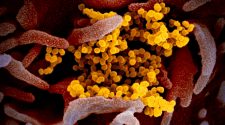The Moderna vaccine, which received emergency-use authorization from the federal government last weekend, does not require the ultra-cold storage that the Pfizer vaccine does. County public health departments and pharmacies are using that vaccine to reach priority groups beyond employees of health care organizations.
PREVIOUSLY:
Carlton County’s public health department, which was allotted 100 doses in its first shipment of the Moderna vaccine, plans to host a drive-thru event within the week to vaccinate people in the first priority group. That includes emergency medical service personnel not employed through a health care organization, as directed by the state and the U.S. Centers for Disease Control and Prevention.
While that event is not open to the general public, the county plans to do similar drive-thru events for the public in the future, said Jenny Barta, a public health nurse for Carlton County Public Health and now the county’s expert on COVID-19.
“Local public health departments are going to be tasked with distributing and administering vaccines to larger populations, to kind of general populations, as well as some priority groups,” Barta said. “Public health is kind of going to be the catch-all for everything else.”

Lucas Goodin, director of emergency preparedness and safety at Cloquet Community Memorial Hospital, draws a dose of the COVID-19 vaccine Tuesday. (Steve Kuchera / [email protected])
Pharmacies will also play a crucial role. Within the county, pharmacies have enrolled in the CDC’s pharmacy partnership to get vaccines to residents of long-term care facilities. Since it’s a federal program, enrolled pharmacies are receiving the Moderna vaccines directly from the federal government.
Those pharmacies will begin vaccinating people in skilled-nursing facilities first as soon as the vaccines arrive in Carlton County, Barta said. As of Tuesday, the state’s health department was expecting to receive 94,800 doses of the Moderna vaccine before the week was up. Most should have arrived in the state Wednesday.
The Fond du Lac Band of the Lake Superior Chippewa received its initial allotment of 700 Moderna doses Wednesday.
Dr. Charity Reynolds, the band’s medical director, became the first of the band’s health care workers to receive the vaccine that day. The rest of the 700 doses prioritized other health care workers and at-risk elders, a news release from the band said.

Dr. Charity Reynolds (right), medical director for the Fond du Lac Band of the Lake Superior Chippewa, received the band’s first vaccine on Wednesday, Dec. 23. The band received 700 doses of the Moderna vaccine earlier that day. (Photo courtesy of the Fond du Lac Band)
Asked when Carlton County might be able to start vaccinating the general population, Barta said there are so many variables that could alter the course of that timeline, including whether more vaccines are authorized for emergency use.
“I wish I had a crystal ball,” Barta said. “But hopefully come springtime, we’ll be opening up to a much wider audience.”
While the counties take vaccine distribution guidance from the state, local public health workers have to make some of those decisions themselves, said Katie Albert, public health planner and COVID-19 vaccine adviser for St. Louis County.
“It’s an ethical dilemma,” Albert said. “We have — and I don’t know that it’s really been called this — but an ethics committee to discuss how do we divide this up so that it is fair.”
It’s not as simple as allocating more vaccines to Duluth for the sole reason that it’s the biggest city in the county.
“If you’re looking at morbidity and mortality of this disease, we know that rural areas are affected (disproportionately),” Albert said. “We have to factor that in as well. It’s definitely been a process trying to figure out how to spread out what we will be getting so that it is equitable.”
The state has three guiding principles public health departments are to follow while planning for vaccine distribution.
The three principles include maximizing immediate health benefit and reducing death and serious illness, equitable distribution and access as well as transparency with Minnesotans.
In the near future, Albert said, the public health division plans to use trailers to bring the vaccine into more rural parts of the country. The county owns a couple trailers set up to store the vaccine. The county could also park the trailers outside worksites should they receive state guidance to do so.
“There are a lot of a lot of areas that are very far from a pharmacy or clinic and we understand that,” Albert said. “Our role in public health is to fill those gaps and go where there’s need.”
















